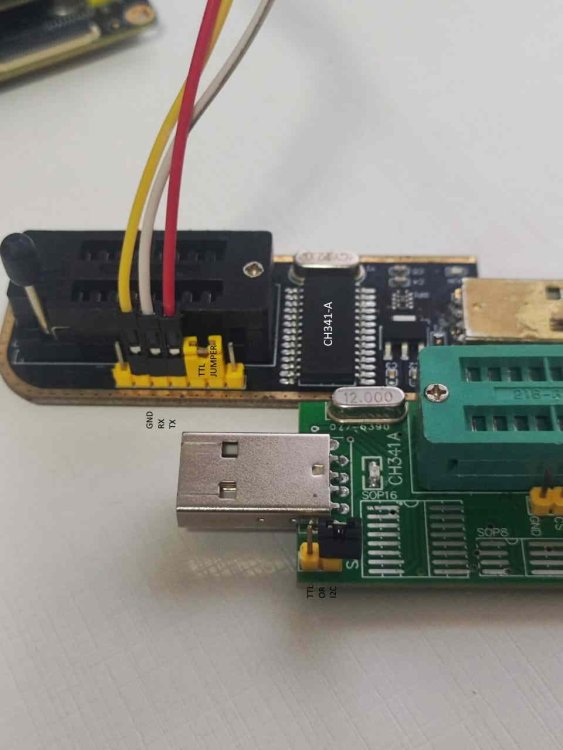All Activity
- Past hour
-
My story is definitely NOT a success story I see the media.patches in the cache folder, I compile armbian edge, but the image didn't contain the cedrus+v4l2 kernel modules I need for decoding acceleration
- Today
-
Some progress : I noticed the warning "checksum failed" when I do get-edid | parse-edid on my asus monitor. As a test, I connected a Dell monitor instead and I don't get the checksum error with it. Also, after a reboot, I do get a full HD 1920x1080 resolution on the Dell monitor! So, the real issue appears to be that the kernel override does not work, the kernel still reads the EDID from the monitor even when fed the extraarg line extraargs=drm_kms_helper.edid_firmware=HDMI-A-1:edid/edid_asus_vs228.bin video=HDMI-A-1:1920x1080@60 drm.debug=0x4 from my defective edid asus monitor, or from the correct generic /lib/firmware/edid/1920x1080.bin file. How do I go about solving this? Who should I talk to? Who builds the armbian kernel? Is there a switch when building it that can be changed to solve this?
-
@Benedito Portela thanks for reply I have another gigabit router that works, but It doesnt have Fiber optics and tnelefone. Idk If this is useful. I contacted my provider because they don't offer access to the router. They said all ports are on automatic and it only works at 100/1000 Mbps. I've tried everything, even changing the TV Box's speed negotiation, but it doesn't support it. The only way that works is to put a device between it and the main router.
-
Some more info, maybe : When I run get-edid | parse-edid, I get this : ~# get-edid | parse-edid This is read-edid version 3.0.2. Prepare for some fun. Attempting to use i2c interface 1 potential busses found: 0 256-byte EDID successfully retrieved from i2c bus 0 Looks like i2c was successful. Have a good day. WARNING: Checksum failed Trying to continue... Section "Monitor" Identifier "ASUS VS228" ModelName "ASUS VS228" VendorName "ACI" # Monitor Manufactured week 43 of 2011 # EDID version 1.3 # Digital Display DisplaySize 480 270 Gamma 2.20 Option "DPMS" "true" Horizsync 24-83 VertRefresh 50-75 # Maximum pixel clock is 170MHz #Not giving standard mode: 1920x1080, 60Hz #Not giving standard mode: 1280x960, 60Hz #Not giving standard mode: 1280x1024, 60Hz #Not giving standard mode: 1440x900, 60Hz #Not giving standard mode: 1680x1050, 60Hz #Not giving standard mode: 1152x864, 75Hz #Not giving standard mode: 1280x720, 60Hz #Not giving standard mode: 1280x800, 60Hz #Extension block found. Parsing... Modeline "Mode 16" -hsync -vsync Modeline "Mode 0" +hsync +vsync Modeline "Mode 1" 25.200 640 656 752 800 480 490 492 525 -hsync -vsync Modeline "Mode 2" 27.027 720 736 798 858 480 489 495 525 -hsync -vsync Modeline "Mode 3" 27.027 720 736 798 858 480 489 495 525 -hsync -vsync Modeline "Mode 4" 27.000 720 732 796 864 576 581 586 625 -hsync -vsync Modeline "Mode 5" 27.000 720 732 796 864 576 581 586 625 -hsync -vsync Modeline "Mode 6" 74.250 1280 1720 1760 1980 720 725 730 750 +hsync +vsync Modeline "Mode 7" 74.250 1280 1390 1420 1650 720 725 730 750 +hsync +vsync Modeline "Mode 8" 74.250 1920 2448 2492 2640 1080 1082 1089 1125 +hsync +vsync interlace Modeline "Mode 9" 74.250 1920 2008 2052 2200 1080 1082 1087 1125 +hsync +vsync interlace Modeline "Mode 10" 54.054 1440 1472 1596 1716 480 489 495 525 -hsync -vsync Modeline "Mode 11" 54.054 1440 1472 1596 1716 480 489 495 525 -hsync -vsync Modeline "Mode 12" 54.000 1440 1464 1592 1728 576 581 586 625 -hsync -vsync Modeline "Mode 13" 54.000 1440 1464 1592 1728 576 581 586 625 -hsync -vsync Modeline "Mode 14" 148.500 1920 2448 2492 2640 1080 1084 1089 1125 +hsync +vsync Modeline "Mode 15" 148.500 1920 2008 2052 2200 1080 1084 1089 1125 +hsync +vsync Modeline "Mode 17" +hsync +vsync Modeline "Mode 18" +hsync +vsync Modeline "Mode 19" -hsync -vsync Option "PreferredMode" "Mode 16" EndSection So, it looks like my monitor/cable/kernel is able to read the EDID from my actual monitor correctly. However, I am still unable to get a 1920x1080 resolution, and I find it strange that I would get this result after forcing a edid.bin file on the kernel arguments. Shouldn't I get back the EDID from the forced EDID bin file instead of my actual monitor?
-

Long Boot Delay on Banana Pi M5 in Headless Mode
gene1934 replied to alex_laco's topic in Banana Pi M5
thanks, pulled it. -
It did not work. Here is the new boot log. My extraarg line looks like this now : extraargs=drm_kms_helper.edid_firmware=HDMI-A-1:edid/edid_asus_vs228.bin video=HDMI-A-1:1920x1080@60 drm.debug=0x4 boot.txt
-
Ok, so probably the timings (frequency) for the 1920x1080 is rejected by the kernel. I took the EDID in your boot log: 00 ff ff ff ff ff ff 00 04 69 fd 22 01 37 02 00 2b 15 01 03 80 30 1b 78 2a 2a c5 a4 56 4f 9e 28 00 50 54 b7 ef 00 d1 c0 81 40 81 80 95 00 b3 00 71 4f 81 c0 81 00 02 3a 80 18 71 38 2d 40 58 2c 45 00 dc 0c 11 00 00 1e 00 00 00 ff 00 42 41 4c 4d 54 46 31 34 35 31 35 33 0a 00 00 00 fd 00 32 4b 18 53 11 00 0a 20 20 20 20 20 20 00 00 00 fc 00 41 53 55 53 20 56 53 32 32 38 0a 20 20 01 b7 and asked ChatGPT to decode it and create a .bin file. Here's the xrandr modeline (just for info): Modeline "1920x1080_60.00" 148.50 1920 2008 2052 2200 1080 1084 1089 1125 +hsync +vsync And the .bin file is attached. I suggest you put the .bin file it in the Armbian location for edids (I don't remember, maybe /lib/firmware/edid/) and try to boot with it (armbianEnv.txt): drm.edid_firmware=HDMI-A-1:edid/asus_vs228.bin See what happens. edid_asus_vs228.bin
-
This meeting is open to anyone currently contributing or interested in helping shape the newsletter going forward. Discussion Topics Strengthening the newsletter process and its impact Expanding our contributor base (authors, vendors, community voices) Improving the flow of raw content from developers Gathering better feedback from readers Ensuring the publishing process runs smoothly We're especially looking for: Fresh ideas to make the newsletter more useful and engaging A volunteer to take on reviewing and approving the first draft before publication 📅 Meeting Details Location: Discord –> Armbian Server -> Lounge Channel Duration: ~45 minutes Looking forward to seeing you there!
-
- Frequently asked question
- Other/unspec
-
(and 2 more)
Tagged with:
-
Hello Павел NetAid, put sd card in windows and resize the small partition with disk format tool.
-

Long Boot Delay on Banana Pi M5 in Headless Mode
c0rnelius replied to alex_laco's topic in Banana Pi M5
Yeah it applies. [🔨] ├───────────────────────────┼─────────────────────┼───────────────── [🔨] │ REVERT-clk-meson-g12a-Fix │ (+6/-6)[1M] g12a.c │ Martijn van Deve [🔨] │ -kernel-warnings-when-no- │ │ clk: meson: g12a [🔨] │ display-attached │ │ kernel warnings [🔨] │ │ │ display attached [🔨] ├───────────────────────────┼─────────────────────┼───────────────── -
Here is the debug boot log : [ 0.000000] Booting Linux on physical CPU 0xf00 [ 0.000000] Linux version 6.12.37-current-rockchip (build@armbian) (arm-linux-gnueabihf-gcc (Ubuntu 13.2.0-23ubuntu4) 13.2.0, GNU ld (GNU Binutils for Ubuntu) 2.42) #1 SMP Thu Jul 10 14:05:15 UTC 2025 [ 0.000000] CPU: ARMv7 Processor [410fc075] revision 5 (ARMv7), cr=10c5387d [ 0.000000] CPU: div instructions available: patching division code [ 0.000000] CPU: PIPT / VIPT nonaliasing data cache, VIPT aliasing instruction cache [ 0.000000] OF: fdt: Machine model: Generic RK322x Tv Box board [ 0.000000] Memory policy: Data cache writealloc [ 0.000000] cma: Reserved 16 MiB at 0xbf000000 on node -1 [ 0.000000] Zone ranges: [ 0.000000] Normal [mem 0x0000000060000000-0x000000009fffffff] [ 0.000000] HighMem [mem 0x00000000a0000000-0x00000000bfffffff] [ 0.000000] Movable zone start for each node [ 0.000000] Early memory node ranges [ 0.000000] node 0: [mem 0x0000000060000000-0x00000000683fffff] [ 0.000000] node 0: [mem 0x0000000069200000-0x00000000bfffffff] [ 0.000000] Initmem setup node 0 [mem 0x0000000060000000-0x00000000bfffffff] [ 0.000000] On node 0, zone Normal: 1536 pages in unavailable ranges [ 0.000000] OF: reserved mem: Reserved memory: No reserved-memory node in the DT [ 0.000000] psci: probing for conduit method from DT. [ 0.000000] psci: PSCIv65535.65535 detected in firmware. [ 0.000000] psci: Using standard PSCI v0.2 function IDs [ 0.000000] psci: MIGRATE_INFO_TYPE not supported. [ 0.000000] psci: SMC Calling Convention v1.0 [ 0.000000] percpu: Embedded 15 pages/cpu s29068 r8192 d24180 u61440 [ 0.000000] pcpu-alloc: s29068 r8192 d24180 u61440 alloc=15*4096 [ 0.000000] pcpu-alloc: [0] 0 [0] 1 [0] 2 [0] 3 [ 0.000000] Kernel command line: earlyprintk root=UUID=87d2bf72-4b91-4d33-8f77-284fa91fc3a7 console=ttyS2,115200n8 console=tty1 rootwait rootfstype=ext4 splash=verbose consoleblank=0 loglevel=1 ubootpart=569f1cc4-01 usb-storage.quirks=0x2537:0x1066:u,0x2537:0x1068:u drm_kms_helper.edid_firmware=HDMI-A-1:edid/1920x1080.bin video=HDMI-A-1:1920x1080@60 drm.debug=0x4 cgroup_enable=cpuset cgroup_memory=1 cgroup_enable=memory [ 0.000000] Unknown kernel command line parameters "earlyprintk splash=verbose ubootpart=569f1cc4-01 cgroup_enable=memory cgroup_memory=1", will be passed to user space. [ 0.000000] Dentry cache hash table entries: 131072 (order: 7, 524288 bytes, linear) [ 0.000000] Inode-cache hash table entries: 65536 (order: 6, 262144 bytes, linear) [ 0.000000] Built 1 zonelists, mobility grouping on. Total pages: 389632 [ 0.000000] allocated 1572864 bytes of page_ext [ 0.000000] mem auto-init: stack:all(zero), heap alloc:off, heap free:off [ 0.000000] SLUB: HWalign=64, Order=0-3, MinObjects=0, CPUs=4, Nodes=1 [ 0.000000] rcu: Hierarchical RCU implementation. [ 0.000000] Tracing variant of Tasks RCU enabled. [ 0.000000] rcu: RCU calculated value of scheduler-enlistment delay is 25 jiffies. [ 0.000000] RCU Tasks Trace: Setting shift to 2 and lim to 1 rcu_task_cb_adjust=1 rcu_task_cpu_ids=4. [ 0.000000] NR_IRQS: 16, nr_irqs: 16, preallocated irqs: 16 [ 0.000000] rcu: srcu_init: Setting srcu_struct sizes based on contention. [ 0.000000] arch_timer: cp15 timer(s) running at 24.00MHz (phys). [ 0.000000] clocksource: arch_sys_counter: mask: 0xffffffffffffff max_cycles: 0x588fe9dc0, max_idle_ns: 440795202592 ns [ 0.000002] sched_clock: 56 bits at 24MHz, resolution 41ns, wraps every 4398046511097ns [ 0.000021] Switching to timer-based delay loop, resolution 41ns [ 0.001537] Console: colour dummy device 80x30 [ 0.001574] printk: legacy console [tty1] enabled [ 0.001762] Calibrating delay loop (skipped), value calculated using timer frequency.. 48.00 BogoMIPS (lpj=96000) [ 0.001796] CPU: Testing write buffer coherency: ok [ 0.001884] pid_max: default: 32768 minimum: 301 [ 0.002012] LSM: initializing lsm=capability,yama [ 0.002094] Yama: becoming mindful. [ 0.002310] Mount-cache hash table entries: 2048 (order: 1, 8192 bytes, linear) [ 0.002344] Mountpoint-cache hash table entries: 2048 (order: 1, 8192 bytes, linear) [ 0.004354] /cpus/cpu@f00 missing clock-frequency property [ 0.004428] /cpus/cpu@f01 missing clock-frequency property [ 0.004463] /cpus/cpu@f02 missing clock-frequency property [ 0.004497] /cpus/cpu@f03 missing clock-frequency property [ 0.004521] CPU0: thread -1, cpu 0, socket 15, mpidr 80000f00 [ 0.007200] Setting up static identity map for 0x60100000 - 0x60100060 [ 0.007577] rcu: Hierarchical SRCU implementation. [ 0.007598] rcu: Max phase no-delay instances is 1000. [ 0.008328] Timer migration: 1 hierarchy levels; 8 children per group; 1 crossnode level [ 0.009570] smp: Bringing up secondary CPUs ... [ 0.011116] CPU1: thread -1, cpu 1, socket 15, mpidr 80000f01 [ 0.013024] CPU2: thread -1, cpu 2, socket 15, mpidr 80000f02 [ 0.014710] CPU3: thread -1, cpu 3, socket 15, mpidr 80000f03 [ 0.014982] smp: Brought up 1 node, 4 CPUs [ 0.015018] SMP: Total of 4 processors activated (192.00 BogoMIPS). [ 0.015035] CPU: All CPU(s) started in SVC mode. [ 0.016494] Memory: 1486080K/1558528K available (16384K kernel code, 1300K rwdata, 9104K rodata, 1024K init, 458K bss, 53660K reserved, 16384K cma-reserved, 507904K highmem) [ 0.017485] devtmpfs: initialized [ 0.031052] VFP support v0.3: implementor 41 architecture 2 part 30 variant 7 rev 5 [ 0.031485] clocksource: jiffies: mask: 0xffffffff max_cycles: 0xffffffff, max_idle_ns: 7645041785100000 ns [ 0.031534] futex hash table entries: 1024 (order: 4, 65536 bytes, linear) [ 0.033000] pinctrl core: initialized pinctrl subsystem [ 0.035570] NET: Registered PF_NETLINK/PF_ROUTE protocol family [ 0.038008] DMA: preallocated 256 KiB pool for atomic coherent allocations [ 0.038970] audit: initializing netlink subsys (disabled) [ 0.039543] audit: type=2000 audit(0.036:1): state=initialized audit_enabled=0 res=1 [ 0.040877] thermal_sys: Registered thermal governor 'step_wise' [ 0.041077] cpuidle: using governor ladder [ 0.041190] cpuidle: using governor menu [ 0.041683] hw-breakpoint: found 5 (+1 reserved) breakpoint and 4 watchpoint registers. [ 0.041713] hw-breakpoint: maximum watchpoint size is 8 bytes. [ 0.045970] /i2s1@100b0000: Fixed dependency cycle(s) with /codec@12010000 [ 0.046140] /codec@12010000: Fixed dependency cycle(s) with /i2s1@100b0000 [ 0.058852] /vop@20050000: Fixed dependency cycle(s) with /hdmi@200a0000 [ 0.059013] /i2s0@100c0000: Fixed dependency cycle(s) with /hdmi@200a0000 [ 0.059132] /hdmi@200a0000: Fixed dependency cycle(s) with /i2s0@100c0000 [ 0.059245] /hdmi@200a0000: Fixed dependency cycle(s) with /vop@20050000 [ 0.072919] gpio gpiochip0: Static allocation of GPIO base is deprecated, use dynamic allocation. [ 0.073819] rockchip-gpio 11110000.gpio: probed /pinctrl/gpio@11110000 [ 0.074717] gpio gpiochip1: Static allocation of GPIO base is deprecated, use dynamic allocation. [ 0.075377] rockchip-gpio 11120000.gpio: probed /pinctrl/gpio@11120000 [ 0.075968] gpio gpiochip2: Static allocation of GPIO base is deprecated, use dynamic allocation. [ 0.076561] rockchip-gpio 11130000.gpio: probed /pinctrl/gpio@11130000 [ 0.077258] gpio gpiochip3: Static allocation of GPIO base is deprecated, use dynamic allocation. [ 0.077875] rockchip-gpio 11140000.gpio: probed /pinctrl/gpio@11140000 [ 0.085807] /spdif@100d0000: Fixed dependency cycle(s) with /spdif-out [ 0.085959] /spdif-out: Fixed dependency cycle(s) with /spdif@100d0000 [ 0.086699] kprobes: kprobe jump-optimization is enabled. All kprobes are optimized if possible. [ 0.157193] raid6: neonx8 gen() 509 MB/s [ 0.225373] raid6: neonx4 gen() 732 MB/s [ 0.293582] raid6: neonx2 gen() 735 MB/s [ 0.361776] raid6: neonx1 gen() 602 MB/s [ 0.429982] raid6: int32x8 gen() 191 MB/s [ 0.498182] raid6: int32x4 gen() 199 MB/s [ 0.566457] raid6: int32x2 gen() 241 MB/s [ 0.634668] raid6: int32x1 gen() 250 MB/s [ 0.634686] raid6: using algorithm neonx2 gen() 735 MB/s [ 0.702770] raid6: .... xor() 546 MB/s, rmw enabled [ 0.702788] raid6: using neon recovery algorithm [ 0.704572] iommu: Default domain type: Translated [ 0.704629] iommu: DMA domain TLB invalidation policy: strict mode [ 0.709665] SCSI subsystem initialized [ 0.710037] usbcore: registered new interface driver usbfs [ 0.710113] usbcore: registered new interface driver hub [ 0.710210] usbcore: registered new device driver usb [ 0.710442] mc: Linux media interface: v0.10 [ 0.710536] videodev: Linux video capture interface: v2.00 [ 0.710720] pps_core: LinuxPPS API ver. 1 registered [ 0.710735] pps_core: Software ver. 5.3.6 - Copyright 2005-2007 Rodolfo Giometti <giometti@linux.it> [ 0.710768] PTP clock support registered [ 0.713955] Bluetooth: Core ver 2.22 [ 0.714071] NET: Registered PF_BLUETOOTH protocol family [ 0.714088] Bluetooth: HCI device and connection manager initialized [ 0.714110] Bluetooth: HCI socket layer initialized [ 0.714126] Bluetooth: L2CAP socket layer initialized [ 0.714170] Bluetooth: SCO socket layer initialized [ 0.714376] NetLabel: Initializing [ 0.714389] NetLabel: domain hash size = 128 [ 0.714401] NetLabel: protocols = UNLABELED CIPSOv4 CALIPSO [ 0.714541] NetLabel: unlabeled traffic allowed by default [ 0.716025] clocksource: Switched to clocksource arch_sys_counter [ 0.716561] VFS: Disk quotas dquot_6.6.0 [ 0.716627] VFS: Dquot-cache hash table entries: 1024 (order 0, 4096 bytes) [ 0.734747] NET: Registered PF_INET protocol family [ 0.735150] IP idents hash table entries: 16384 (order: 5, 131072 bytes, linear) [ 0.829855] tcp_listen_portaddr_hash hash table entries: 512 (order: 0, 4096 bytes, linear) [ 0.829940] Table-perturb hash table entries: 65536 (order: 6, 262144 bytes, linear) [ 0.830302] TCP established hash table entries: 8192 (order: 3, 32768 bytes, linear) [ 0.830426] TCP bind hash table entries: 8192 (order: 5, 131072 bytes, linear) [ 0.830797] TCP: Hash tables configured (established 8192 bind 8192) [ 0.831023] UDP hash table entries: 512 (order: 2, 16384 bytes, linear) [ 0.831127] UDP-Lite hash table entries: 512 (order: 2, 16384 bytes, linear) [ 0.831578] NET: Registered PF_UNIX/PF_LOCAL protocol family [ 0.834711] Trying to unpack rootfs image as initramfs... [ 0.836190] Initialise system trusted keyrings [ 0.836798] workingset: timestamp_bits=14 max_order=19 bucket_order=5 [ 0.836919] zbud: loaded [ 0.838518] SGI XFS with ACLs, security attributes, realtime, scrub, quota, fatal assert, debug enabled [ 1.130118] xor: measuring software checksum speed [ 1.134399] arm4regs : 774 MB/sec [ 1.139665] 8regs : 630 MB/sec [ 1.144950] 32regs : 626 MB/sec [ 1.148071] neon : 1067 MB/sec [ 1.148109] xor: using function: neon (1067 MB/sec) [ 1.148140] async_tx: api initialized (async) [ 1.148163] Key type asymmetric registered [ 1.148180] Asymmetric key parser 'x509' registered [ 1.148436] bounce: pool size: 64 pages [ 1.148613] Block layer SCSI generic (bsg) driver version 0.4 loaded (major 242) [ 1.149266] io scheduler mq-deadline registered [ 1.149302] io scheduler kyber registered [ 1.149377] io scheduler bfq registered [ 1.556569] Freeing initrd memory: 8756K [ 1.560194] ledtrig-cpu: registered to indicate activity on CPUs [ 1.566071] dma-pl330 110f0000.dma-controller: Loaded driver for PL330 DMAC-241330 [ 1.566123] dma-pl330 110f0000.dma-controller: DBUFF-128x8bytes Num_Chans-8 Num_Peri-20 Num_Events-16 [ 1.571349] Serial: 8250/16550 driver, 5 ports, IRQ sharing disabled [ 1.578535] printk: legacy console [ttyS2] disabled [ 1.579334] 11030000.serial: ttyS2 at MMIO 0x11030000 (irq = 38, base_baud = 1500000) is a 16550A [ 1.580263] printk: legacy console [ttyS2] enabled [ 1.587196] rockchip-vop 20050000.vop: Adding to iommu group 0 [ 1.591157] usbcore: registered new interface driver udl [ 1.592989] brd: module loaded [ 1.604785] loop: module loaded [ 1.608234] tun: Universal TUN/TAP device driver, 1.6 [ 1.608732] CAN device driver interface [ 1.610064] rk_gmac-dwmac 30200000.ethernet: IRQ eth_wake_irq not found [ 1.610098] rk_gmac-dwmac 30200000.ethernet: IRQ eth_lpi not found [ 1.610117] rk_gmac-dwmac 30200000.ethernet: IRQ sfty not found [ 1.610322] rk_gmac-dwmac 30200000.ethernet: PTP uses main clock [ 1.610662] rk_gmac-dwmac 30200000.ethernet: clock input or output? (output). [ 1.610693] rk_gmac-dwmac 30200000.ethernet: TX delay(0x26). [ 1.610712] rk_gmac-dwmac 30200000.ethernet: RX delay(0x11). [ 1.610754] rk_gmac-dwmac 30200000.ethernet: integrated PHY? (yes). [ 1.616088] rk_gmac-dwmac 30200000.ethernet: init for RMII [ 1.652669] rk_gmac-dwmac 30200000.ethernet: User ID: 0x10, Synopsys ID: 0x35 [ 1.652727] rk_gmac-dwmac 30200000.ethernet: DWMAC1000 [ 1.652749] rk_gmac-dwmac 30200000.ethernet: DMA HW capability register supported [ 1.652765] rk_gmac-dwmac 30200000.ethernet: RX Checksum Offload Engine supported [ 1.652779] rk_gmac-dwmac 30200000.ethernet: COE Type 2 [ 1.652797] rk_gmac-dwmac 30200000.ethernet: TX Checksum insertion supported [ 1.652811] rk_gmac-dwmac 30200000.ethernet: Wake-Up On Lan supported [ 1.652957] rk_gmac-dwmac 30200000.ethernet: Normal descriptors [ 1.652977] rk_gmac-dwmac 30200000.ethernet: Ring mode enabled [ 1.652992] rk_gmac-dwmac 30200000.ethernet: Enable RX Mitigation via HW Watchdog Timer [ 1.677755] usbcore: registered new interface driver rt2500usb [ 1.677890] usbcore: registered new interface driver rt73usb [ 1.677980] usbcore: registered new interface driver rt2800usb [ 1.678061] usbcore: registered new interface driver cdc_ether [ 1.678157] usbcore: registered new interface driver rndis_host [ 1.679282] dwc2 30040000.usb: supply vusb_d not found, using dummy regulator [ 1.679532] dwc2 30040000.usb: supply vusb_a not found, using dummy regulator [ 1.701461] dwc2 30040000.usb: DWC OTG Controller [ 1.701556] dwc2 30040000.usb: new USB bus registered, assigned bus number 1 [ 1.701629] dwc2 30040000.usb: irq 44, io mem 0x30040000 [ 1.702067] usb usb1: New USB device found, idVendor=1d6b, idProduct=0002, bcdDevice= 6.12 [ 1.702097] usb usb1: New USB device strings: Mfr=3, Product=2, SerialNumber=1 [ 1.702116] usb usb1: Product: DWC OTG Controller [ 1.702132] usb usb1: Manufacturer: Linux 6.12.37-current-rockchip dwc2_hsotg [ 1.702148] usb usb1: SerialNumber: 30040000.usb [ 1.703363] hub 1-0:1.0: USB hub found [ 1.703469] hub 1-0:1.0: 1 port detected [ 1.708644] usbcore: registered new interface driver usb-storage [ 1.710262] ehci-platform 300c0000.usb: EHCI Host Controller [ 1.710335] ehci-platform 30080000.usb: EHCI Host Controller [ 1.711082] usbcore: registered new interface driver iforce [ 1.711316] usbcore: registered new interface driver xpad [ 1.711316] ohci-platform 300e0000.usb: Generic Platform OHCI controller [ 1.711630] usbcore: registered new interface driver usbtouchscreen [ 1.711681] ehci-platform 30080000.usb: new USB bus registered, assigned bus number 3 [ 1.711681] ehci-platform 300c0000.usb: new USB bus registered, assigned bus number 2 [ 1.711837] ohci-platform 300a0000.usb: Generic Platform OHCI controller [ 1.711881] ehci-platform 30100000.usb: EHCI Host Controller [ 1.712537] ohci-platform 300e0000.usb: new USB bus registered, assigned bus number 4 [ 1.712588] ohci-platform 300a0000.usb: new USB bus registered, assigned bus number 5 [ 1.712690] ehci-platform 30100000.usb: new USB bus registered, assigned bus number 6 [ 1.712742] ohci-platform 30120000.usb: Generic Platform OHCI controller [ 1.713205] i2c_dev: i2c /dev entries driver [ 1.713410] ohci-platform 30120000.usb: new USB bus registered, assigned bus number 7 [ 1.714175] ohci-platform 300e0000.usb: irq 49, io mem 0x300e0000 [ 1.715620] ohci-platform 300a0000.usb: irq 48, io mem 0x300a0000 [ 1.716792] device-mapper: ioctl: 4.48.0-ioctl (2023-03-01) initialised: dm-devel@lists.linux.dev [ 1.718127] Bluetooth: HCI UART driver ver 2.3 [ 1.718169] Bluetooth: HCI UART protocol H4 registered [ 1.718184] Bluetooth: HCI UART protocol ATH3K registered [ 1.718278] Bluetooth: HCI UART protocol Three-wire (H5) registered [ 1.718470] ehci-platform 30080000.usb: irq 45, io mem 0x30080000 [ 1.718510] Bluetooth: HCI UART protocol Broadcom registered [ 1.718658] usbcore: registered new interface driver bfusb [ 1.718814] usbcore: registered new interface driver btusb [ 1.719120] ohci-platform 30120000.usb: irq 50, io mem 0x30120000 [ 1.719646] ehci-platform 30100000.usb: irq 47, io mem 0x30100000 [ 1.720683] sdhci: Secure Digital Host Controller Interface driver [ 1.720714] sdhci: Copyright(c) Pierre Ossman [ 1.720726] Synopsys Designware Multimedia Card Interface Driver [ 1.720909] ehci-platform 300c0000.usb: irq 46, io mem 0x300c0000 [ 1.721454] sdhci-pltfm: SDHCI platform and OF driver helper [ 1.721622] hid: raw HID events driver (C) Jiri Kosina [ 1.722359] usbcore: registered new interface driver usbhid [ 1.722398] usbhid: USB HID core driver [ 1.722956] dwmmc_rockchip 30000000.mmc: IDMAC supports 32-bit address mode. [ 1.723087] rockchip-dfi 11210000.dfi: dfi initialized, dram type: 0x6, channels: 1 [ 1.723936] dwmmc_rockchip 30000000.mmc: Using internal DMA controller. [ 1.724089] dwmmc_rockchip 30000000.mmc: Version ID is 270a [ 1.724219] dwmmc_rockchip 30000000.mmc: DW MMC controller at irq 51,32 bit host data width,256 deep fifo [ 1.724661] dwmmc_rockchip 30000000.mmc: Got CD GPIO [ 1.724701] dwmmc_rockchip 30010000.mmc: IDMAC supports 32-bit address mode. [ 1.724992] dwmmc_rockchip 30020000.mmc: IDMAC supports 32-bit address mode. [ 1.726553] dwmmc_rockchip 30010000.mmc: Using internal DMA controller. [ 1.726607] dwmmc_rockchip 30010000.mmc: Version ID is 270a [ 1.726720] dwmmc_rockchip 30010000.mmc: DW MMC controller at irq 52,32 bit host data width,256 deep fifo [ 1.727046] dwmmc_rockchip 30010000.mmc: allocated mmc-pwrseq [ 1.727051] hw perfevents: enabled with armv7_cortex_a7 PMU driver, 5 (8000000f) counters available [ 1.727081] mmc_host mmc1: card is non-removable. [ 1.727587] dwmmc_rockchip 30020000.mmc: Using internal DMA controller. [ 1.727630] dwmmc_rockchip 30020000.mmc: Version ID is 270a [ 1.727724] dwmmc_rockchip 30020000.mmc: DW MMC controller at irq 53,32 bit host data width,256 deep fifo [ 1.728187] mmc_host mmc2: card is non-removable. [ 1.728216] ehci-platform 30080000.usb: USB 2.0 started, EHCI 1.00 [ 1.728726] usb usb3: New USB device found, idVendor=1d6b, idProduct=0002, bcdDevice= 6.12 [ 1.728770] usb usb3: New USB device strings: Mfr=3, Product=2, SerialNumber=1 [ 1.728791] usb usb3: Product: EHCI Host Controller [ 1.728807] usb usb3: Manufacturer: Linux 6.12.37-current-rockchip ehci_hcd [ 1.728824] usb usb3: SerialNumber: 30080000.usb [ 1.730118] hub 3-0:1.0: USB hub found [ 1.730501] hub 3-0:1.0: 1 port detected [ 1.731351] NET: Registered PF_INET6 protocol family [ 1.734443] Segment Routing with IPv6 [ 1.734583] In-situ OAM (IOAM) with IPv6 [ 1.734814] sit: IPv6, IPv4 and MPLS over IPv4 tunneling driver [ 1.736185] mmc_host mmc0: Bus speed (slot 0) = 400000Hz (slot req 400000Hz, actual 400000HZ div = 0) [ 1.737121] NET: Registered PF_PACKET protocol family [ 1.737197] bridge: filtering via arp/ip/ip6tables is no longer available by default. Update your scripts to load br_netfilter if you need this. [ 1.737217] can: controller area network core [ 1.737290] NET: Registered PF_CAN protocol family [ 1.737718] Bluetooth: RFCOMM TTY layer initialized [ 1.737775] Bluetooth: RFCOMM socket layer initialized [ 1.737832] Bluetooth: RFCOMM ver 1.11 [ 1.737864] Bluetooth: HIDP (Human Interface Emulation) ver 1.2 [ 1.737886] Bluetooth: HIDP socket layer initialized [ 1.738362] Key type dns_resolver registered [ 1.738760] ThumbEE CPU extension supported. [ 1.738797] Registering SWP/SWPB emulation handler [ 1.740111] mmc_host mmc1: Bus speed (slot 0) = 400000Hz (slot req 400000Hz, actual 400000HZ div = 0) [ 1.740157] ehci-platform 30100000.usb: USB 2.0 started, EHCI 1.00 [ 1.740288] mmc_host mmc2: Bus speed (slot 0) = 400000Hz (slot req 400000Hz, actual 400000HZ div = 0) [ 1.740633] usb usb6: New USB device found, idVendor=1d6b, idProduct=0002, bcdDevice= 6.12 [ 1.740667] usb usb6: New USB device strings: Mfr=3, Product=2, SerialNumber=1 [ 1.740688] usb usb6: Product: EHCI Host Controller [ 1.740705] usb usb6: Manufacturer: Linux 6.12.37-current-rockchip ehci_hcd [ 1.740721] usb usb6: SerialNumber: 30100000.usb [ 1.742226] hub 6-0:1.0: USB hub found [ 1.742341] hub 6-0:1.0: 1 port detected [ 1.752147] ehci-platform 300c0000.usb: USB 2.0 started, EHCI 1.00 [ 1.752947] usb usb2: New USB device found, idVendor=1d6b, idProduct=0002, bcdDevice= 6.12 [ 1.752993] usb usb2: New USB device strings: Mfr=3, Product=2, SerialNumber=1 [ 1.753014] usb usb2: Product: EHCI Host Controller [ 1.753030] usb usb2: Manufacturer: Linux 6.12.37-current-rockchip ehci_hcd [ 1.753047] usb usb2: SerialNumber: 300c0000.usb [ 1.754834] hub 2-0:1.0: USB hub found [ 1.754958] hub 2-0:1.0: 1 port detected [ 1.759358] registered taskstats version 1 [ 1.759781] Loading compiled-in X.509 certificates [ 1.772947] usb usb4: New USB device found, idVendor=1d6b, idProduct=0001, bcdDevice= 6.12 [ 1.773012] usb usb4: New USB device strings: Mfr=3, Product=2, SerialNumber=1 [ 1.773037] usb usb4: Product: Generic Platform OHCI controller [ 1.773056] usb usb4: Manufacturer: Linux 6.12.37-current-rockchip ohci_hcd [ 1.773073] usb usb4: SerialNumber: 300e0000.usb [ 1.773199] mmc_host mmc1: Bus speed (slot 0) = 50000000Hz (slot req 50000000Hz, actual 50000000HZ div = 0) [ 1.775696] hub 4-0:1.0: USB hub found [ 1.775777] mmc1: new high speed SDIO card at address 0001 [ 1.776303] hub 4-0:1.0: 1 port detected [ 1.778355] zswap: loaded using pool zstd/zbud [ 1.779650] usb usb5: New USB device found, idVendor=1d6b, idProduct=0001, bcdDevice= 6.12 [ 1.779706] usb usb5: New USB device strings: Mfr=3, Product=2, SerialNumber=1 [ 1.779726] usb usb5: Product: Generic Platform OHCI controller [ 1.779743] usb usb5: Manufacturer: Linux 6.12.37-current-rockchip ohci_hcd [ 1.779761] usb usb5: SerialNumber: 300a0000.usb [ 1.780820] Key type .fscrypt registered [ 1.780861] Key type fscrypt-provisioning registered [ 1.781113] hub 5-0:1.0: USB hub found [ 1.781252] hub 5-0:1.0: 1 port detected [ 1.782665] usb usb7: New USB device found, idVendor=1d6b, idProduct=0001, bcdDevice= 6.12 [ 1.782715] usb usb7: New USB device strings: Mfr=3, Product=2, SerialNumber=1 [ 1.782735] usb usb7: Product: Generic Platform OHCI controller [ 1.782752] usb usb7: Manufacturer: Linux 6.12.37-current-rockchip ohci_hcd [ 1.782769] usb usb7: SerialNumber: 30120000.usb [ 1.783091] Btrfs loaded, zoned=no, fsverity=no [ 1.783970] hub 7-0:1.0: USB hub found [ 1.784189] hub 7-0:1.0: 1 port detected [ 1.848557] mmc_host mmc2: Bus speed (slot 0) = 50000000Hz (slot req 52000000Hz, actual 50000000HZ div = 0) [ 1.849018] mmc2: new high speed MMC card at address 0001 [ 1.850668] mmcblk2: mmc2:0001 QN16MB 7.28 GiB [ 1.854231] mmcblk2: p1 [ 1.855672] mmcblk2boot0: mmc2:0001 QN16MB 4.00 MiB [ 1.859480] mmcblk2boot1: mmc2:0001 QN16MB 4.00 MiB [ 1.862788] mmcblk2rpmb: mmc2:0001 QN16MB 512 KiB, chardev (239:0) [ 1.976094] Key type encrypted registered [ 1.988215] usb 1-1: new full-speed USB device number 2 using dwc2 [ 1.995738] inno-hdmi-phy 12030000.hdmi-phy: error -ENXIO: IRQ index 0 not found [ 1.996292] inno-hdmi-phy 12030000.hdmi-phy: phy_flag is: 0 [ 1.999254] rockchip-drm display-subsystem: bound 20050000.vop (ops 0xb1189588) [ 1.999438] dwhdmi-rockchip 200a0000.hdmi: supply avdd-0v9 not found, using dummy regulator [ 1.999758] dwhdmi-rockchip 200a0000.hdmi: supply avdd-1v8 not found, using dummy regulator [ 2.000383] dwhdmi-rockchip 200a0000.hdmi: Detected HDMI TX controller v2.01a with HDCP (inno_dw_hdmi_phy2) [ 2.001885] dwhdmi-rockchip 200a0000.hdmi: registered DesignWare HDMI I2C bus driver [ 2.002350] [drm:__drm_connector_init] cmdline mode for connector HDMI-A-1 1920x1080@60Hz [ 2.002454] rockchip-drm display-subsystem: bound 200a0000.hdmi (ops 0xb118d904) [ 2.003642] rockchip-drm display-subsystem: [drm:drm_sysfs_connector_add] [CONNECTOR:47:HDMI-A-1] adding connector to sysfs [ 2.003976] rockchip-drm display-subsystem: [drm:drm_sysfs_connector_hotplug_event] [CONNECTOR:47:HDMI-A-1] generating connector hotplug event [ 2.004124] [drm] Initialized rockchip 1.0.0 for display-subsystem on minor 0 [ 2.004171] rockchip-drm display-subsystem: [drm:drm_client_modeset_probe] [ 2.004230] rockchip-drm display-subsystem: [drm:drm_helper_probe_single_connector_modes] [CONNECTOR:47:HDMI-A-1] [ 2.004283] rockchip-drm display-subsystem: [drm:drm_helper_probe_single_connector_modes] [CONNECTOR:47:HDMI-A-1] status updated from unknown to connected [ 2.004378] rockchip-drm display-subsystem: [drm:drm_sysfs_hotplug_event] generating hotplug event [ 2.184813] usb 1-1: New USB device found, idVendor=045e, idProduct=0745, bcdDevice= 6.76 [ 2.184878] usb 1-1: New USB device strings: Mfr=1, Product=2, SerialNumber=0 [ 2.184899] usb 1-1: Product: Microsoft® 2.4GHz Transceiver v8.0 [ 2.184915] usb 1-1: Manufacturer: Microsoft [ 2.194119] input: Microsoft Microsoft® 2.4GHz Transceiver v8.0 as /devices/platform/30040000.usb/usb1/1-1/1-1:1.0/0003:045E:0745.0001/input/input0 [ 2.224332] EDID block 0 (tag 0x00) checksum is invalid, remainder is 198 [ 2.224372] rockchip-drm display-subsystem: [drm:connector_bad_edid] [CONNECTOR:47:HDMI-A-1] EDID is invalid: [ 2.224424] [00] BAD 00 ff ff ff ff ff ff 00 04 69 fd 22 01 37 02 00 [ 2.224438] [00] BAD 2b 15 01 03 80 30 1b 78 2a 2a c5 a4 56 4f 9e 28 [ 2.224451] [00] BAD 00 50 54 b7 ef 00 d1 c0 81 40 81 80 95 00 b3 00 [ 2.224463] [00] BAD 71 4f 81 c0 81 00 02 3a 80 18 71 38 2d 40 58 2c [ 2.224476] [00] BAD 45 00 dc 0c 11 00 00 1e 00 00 00 ff 00 42 41 4c [ 2.224488] [00] BAD 4d 54 46 31 34 35 31 35 33 0a 00 00 00 fd 00 32 [ 2.224501] [00] BAD 4b 18 53 11 00 0a 20 20 20 20 20 20 00 00 00 fc [ 2.224513] [00] BAD 00 41 53 55 53 20 56 53 32 32 38 0a 20 20 01 b7 [ 2.225478] rockchip-drm display-subsystem: [drm:drm_mode_prune_invalid] Rejected mode: "640x480": 60 25175 640 656 752 800 480 490 492 525 0x40 0xa (BAD) [ 2.225529] rockchip-drm display-subsystem: [drm:drm_mode_prune_invalid] Rejected mode: "848x480": 60 33750 848 864 976 1088 480 486 494 517 0x40 0x5 (BAD) [ 2.225568] rockchip-drm display-subsystem: [drm] User-defined mode not supported: "1920x1080": 60 172780 1920 2040 2248 2576 1080 1081 1084 1118 0x20 0x6 [ 2.225598] rockchip-drm display-subsystem: [drm:drm_mode_prune_invalid] Rejected mode: "1920x1080": 60 172780 1920 2040 2248 2576 1080 1081 1084 1118 0x20 0x6 (BAD) [ 2.225642] rockchip-drm display-subsystem: [drm:drm_helper_probe_single_connector_modes] [CONNECTOR:47:HDMI-A-1] probed modes: [ 2.225678] rockchip-drm display-subsystem: [drm:drm_helper_probe_single_connector_modes] Probed mode: "1024x768": 60 65000 1024 1048 1184 1344 768 771 777 806 0x40 0xa [ 2.225721] rockchip-drm display-subsystem: [drm:drm_helper_probe_single_connector_modes] Probed mode: "800x600": 60 40000 800 840 968 1056 600 601 605 628 0x40 0x5 [ 2.225763] rockchip-drm display-subsystem: [drm:drm_helper_probe_single_connector_modes] Probed mode: "800x600": 56 36000 800 824 896 1024 600 601 603 625 0x40 0x5 [ 2.225805] rockchip-drm display-subsystem: [drm:drm_client_modeset_probe] [CONNECTOR:47:HDMI-A-1] enabled? yes [ 2.225849] rockchip-drm display-subsystem: [drm:drm_client_modeset_probe] Not using firmware configuration [ 2.225881] rockchip-drm display-subsystem: [drm:drm_client_modeset_probe] [CONNECTOR:47:HDMI-A-1] looking for cmdline mode [ 2.225911] rockchip-drm display-subsystem: [drm:drm_client_modeset_probe] [CONNECTOR:47:HDMI-A-1] looking for preferred mode, tile 0 [ 2.225941] rockchip-drm display-subsystem: [drm:drm_client_modeset_probe] [CONNECTOR:47:HDMI-A-1] Found mode 1024x768 [ 2.225969] rockchip-drm display-subsystem: [drm:drm_client_modeset_probe] picking CRTCs for 4096x4096 config [ 2.226002] rockchip-drm display-subsystem: [drm:drm_client_modeset_probe] [CRTC:45:crtc-0] desired mode 1024x768 set (0,0) [ 2.226043] rockchip-drm display-subsystem: [drm:__drm_fb_helper_initial_config_and_unlock] test CRTC 0 primary plane [ 2.226088] rockchip-drm display-subsystem: [drm:drm_fbdev_dma_driver_fbdev_probe] surface width(1024), height(768) and bpp(32) [ 2.236082] rockchip-drm display-subsystem: [drm:drm_mode_addfb2] [FB:50] [ 2.242643] Console: switching to colour frame buffer device 128x48 [ 2.249949] hid-generic 0003:045E:0745.0001: input,hidraw0: USB HID v1.11 Keyboard [Microsoft Microsoft® 2.4GHz Transceiver v8.0] on usb-30040000.usb-1/input0 [ 2.266243] input: Microsoft Microsoft® 2.4GHz Transceiver v8.0 Mouse as /devices/platform/30040000.usb/usb1/1-1/1-1:1.1/0003:045E:0745.0002/input/input1 [ 2.267284] input: Microsoft Microsoft® 2.4GHz Transceiver v8.0 Consumer Control as /devices/platform/30040000.usb/usb1/1-1/1-1:1.1/0003:045E:0745.0002/input/input2 [ 2.271583] rockchip-drm display-subsystem: [drm] fb0: rockchipdrmfb frame buffer device [ 2.272078] rockchip-drm display-subsystem: [drm:drm_fb_helper_hotplug_event] [ 2.272203] rockchip-drm display-subsystem: [drm:drm_client_modeset_probe] [ 2.272257] rockchip-drm display-subsystem: [drm:drm_helper_probe_single_connector_modes] [CONNECTOR:47:HDMI-A-1] [ 2.272638] of_cfs_init [ 2.272752] of_cfs_init: OK [ 2.321368] hid-generic 0003:045E:0745.0002: input,hidraw1: USB HID v1.11 Mouse [Microsoft Microsoft® 2.4GHz Transceiver v8.0] on usb-30040000.usb-1/input1 [ 2.337205] input: Microsoft Microsoft® 2.4GHz Transceiver v8.0 Consumer Control as /devices/platform/30040000.usb/usb1/1-1/1-1:1.2/0003:045E:0745.0003/input/input3 [ 2.393210] input: Microsoft Microsoft® 2.4GHz Transceiver v8.0 System Control as /devices/platform/30040000.usb/usb1/1-1/1-1:1.2/0003:045E:0745.0003/input/input5 [ 2.394900] hid-generic 0003:045E:0745.0003: input,hiddev96,hidraw2: USB HID v1.11 Device [Microsoft Microsoft® 2.4GHz Transceiver v8.0] on usb-30040000.usb-1/input2 [ 2.490255] cfg80211: Loading compiled-in X.509 certificates for regulatory database [ 2.513688] EDID block 0 (tag 0x00) checksum is invalid, remainder is 198 [ 2.513765] rockchip-drm display-subsystem: [drm:connector_bad_edid] [CONNECTOR:47:HDMI-A-1] EDID is invalid: [ 2.513828] [00] BAD 00 ff ff ff ff ff ff 00 04 69 fd 22 01 37 02 00 [ 2.513847] [00] BAD 2b 15 01 03 80 30 1b 78 2a 2a c5 a4 56 4f 9e 28 [ 2.513860] [00] BAD 00 50 54 b7 ef 00 d1 c0 81 40 81 80 95 00 b3 00 [ 2.513876] [00] BAD 71 4f 81 c0 81 00 02 3a 80 18 71 38 2d 40 58 2c [ 2.513888] [00] BAD 45 00 dc 0c 11 00 00 1e 00 00 00 ff 00 42 41 4c [ 2.513901] [00] BAD 4d 54 46 31 34 35 31 35 33 0a 00 00 00 fd 00 32 [ 2.513916] [00] BAD 4b 18 53 11 00 0a 20 20 20 20 20 20 00 00 00 fc [ 2.513940] [00] BAD 00 41 53 55 53 20 56 53 32 32 38 0a 20 20 01 b7 [ 2.514854] rockchip-drm display-subsystem: [drm:drm_mode_prune_invalid] Rejected mode: "640x480": 60 25175 640 656 752 800 480 490 492 525 0x40 0xa (BAD) [ 2.514958] rockchip-drm display-subsystem: [drm:drm_mode_prune_invalid] Rejected mode: "848x480": 60 33750 848 864 976 1088 480 486 494 517 0x40 0x5 (BAD) [ 2.515047] rockchip-drm display-subsystem: [drm] User-defined mode not supported: "1920x1080": 60 172780 1920 2040 2248 2576 1080 1081 1084 1118 0x20 0x6 [ 2.515079] rockchip-drm display-subsystem: [drm:drm_mode_prune_invalid] Rejected mode: "1920x1080": 60 172780 1920 2040 2248 2576 1080 1081 1084 1118 0x20 0x6 (VIRTUAL_X) [ 2.515130] rockchip-drm display-subsystem: [drm:drm_helper_probe_single_connector_modes] [CONNECTOR:47:HDMI-A-1] probed modes: [ 2.515204] rockchip-drm display-subsystem: [drm:drm_helper_probe_single_connector_modes] Probed mode: "1024x768": 60 65000 1024 1048 1184 1344 768 771 777 806 0x40 0xa [ 2.515256] rockchip-drm display-subsystem: [drm:drm_helper_probe_single_connector_modes] Probed mode: "800x600": 60 40000 800 840 968 1056 600 601 605 628 0x40 0x5 [ 2.515299] rockchip-drm display-subsystem: [drm:drm_helper_probe_single_connector_modes] Probed mode: "800x600": 56 36000 800 824 896 1024 600 601 603 625 0x40 0x5 [ 2.515344] rockchip-drm display-subsystem: [drm:drm_client_modeset_probe] [CONNECTOR:47:HDMI-A-1] enabled? yes [ 2.515395] rockchip-drm display-subsystem: [drm:drm_client_modeset_probe] Not using firmware configuration [ 2.515431] rockchip-drm display-subsystem: [drm:drm_client_modeset_probe] [CONNECTOR:47:HDMI-A-1] looking for cmdline mode [ 2.515483] rockchip-drm display-subsystem: [drm:drm_client_modeset_probe] [CONNECTOR:47:HDMI-A-1] looking for preferred mode, tile 0 [ 2.515516] rockchip-drm display-subsystem: [drm:drm_client_modeset_probe] [CONNECTOR:47:HDMI-A-1] Found mode 1024x768 [ 2.515546] rockchip-drm display-subsystem: [drm:drm_client_modeset_probe] picking CRTCs for 1024x768 config [ 2.515588] rockchip-drm display-subsystem: [drm:drm_client_modeset_probe] [CRTC:45:crtc-0] desired mode 1024x768 set (0,0) [ 2.526055] rockchip-drm display-subsystem: [drm:drm_client_dev_hotplug] fbdev: ret=0 [ 2.537979] Loaded X.509 cert 'sforshee: 00b28ddf47aef9cea7' [ 2.540563] Loaded X.509 cert 'wens: 61c038651aabdcf94bd0ac7ff06c7248db18c600' [ 2.540754] clk: Disabling unused clocks [ 2.540998] PM: genpd: Disabling unused power domains [ 2.544535] Freeing unused kernel image (initmem) memory: 1024K [ 2.545305] Run /init as init process [ 2.545335] with arguments: [ 2.545347] /init [ 2.545359] earlyprintk [ 2.545370] with environment: [ 2.545379] HOME=/ [ 2.545389] TERM=linux [ 2.545399] splash=verbose [ 2.545410] ubootpart=569f1cc4-01 [ 2.545421] cgroup_enable=memory [ 2.545431] cgroup_memory=1 [ 2.548179] cfg80211: loaded regulatory.db is malformed or signature is missing/invalid [ 3.534285] rk_gmac-dwmac 30200000.ethernet end0: renamed from eth0 [ 4.200467] EXT4-fs (mmcblk2p1): mounted filesystem 87d2bf72-4b91-4d33-8f77-284fa91fc3a7 ro with writeback data mode. Quota mode: none. [ 4.742875] systemd[1]: System time before build time, advancing clock. [ 4.786705] systemd[1]: systemd 252.38-1~deb12u1 running in system mode (+PAM +AUDIT +SELINUX +APPARMOR +IMA +SMACK +SECCOMP +GCRYPT -GNUTLS +OPENSSL +ACL +BLKID +CURL +ELFUTILS +FIDO2 +IDN2 -IDN +IPTC +KMOD +LIBCRYPTSETUP +LIBFDISK +PCRE2 -PWQUALITY +P11KIT +QRENCODE +TPM2 +BZIP2 +LZ4 +XZ +ZLIB +ZSTD -BPF_FRAMEWORK -XKBCOMMON +UTMP +SYSVINIT default-hierarchy=unified) [ 4.786850] systemd[1]: Detected architecture arm. [ 4.794711] systemd[1]: Hostname set to <rk322x-box>. [ 5.040997] dw-apb-uart 11030000.serial: forbid DMA for kernel console [ 6.235862] systemd[1]: Queued start job for default target graphical.target. [ 6.285959] systemd[1]: Created slice system-getty.slice - Slice /system/getty. [ 6.292737] systemd[1]: Created slice system-modprobe.slice - Slice /system/modprobe. [ 6.298346] systemd[1]: Created slice system-serial\x2dgetty.slice - Slice /system/serial-getty. [ 6.302571] systemd[1]: Created slice user.slice - User and Session Slice. [ 6.304498] systemd[1]: Started systemd-ask-password-console.path - Dispatch Password Requests to Console Directory Watch. [ 6.306231] systemd[1]: Started systemd-ask-password-wall.path - Forward Password Requests to Wall Directory Watch. [ 6.310274] systemd[1]: Set up automount proc-sys-fs-binfmt_misc.automount - Arbitrary Executable File Formats File System Automount Point. [ 6.311776] systemd[1]: Expecting device dev-ttyS2.device - /dev/ttyS2... [ 6.312895] systemd[1]: Expecting device sys-subsystem-net-devices-wlan1.device - /sys/subsystem/net/devices/wlan1... [ 6.314021] systemd[1]: Reached target cryptsetup.target - Local Encrypted Volumes. [ 6.315299] systemd[1]: Reached target integritysetup.target - Local Integrity Protected Volumes. [ 6.317065] systemd[1]: Reached target paths.target - Path Units. [ 6.318279] systemd[1]: Reached target remote-fs.target - Remote File Systems. [ 6.319179] systemd[1]: Reached target slices.target - Slice Units. [ 6.320528] systemd[1]: Reached target swap.target - Swaps. [ 6.321812] systemd[1]: Reached target veritysetup.target - Local Verity Protected Volumes. [ 6.324574] systemd[1]: Listening on syslog.socket - Syslog Socket. [ 6.327737] systemd[1]: Listening on systemd-fsckd.socket - fsck to fsckd communication Socket. [ 6.329864] systemd[1]: Listening on systemd-initctl.socket - initctl Compatibility Named Pipe. [ 6.333579] systemd[1]: Listening on systemd-journald-audit.socket - Journal Audit Socket. [ 6.336332] systemd[1]: Listening on systemd-journald-dev-log.socket - Journal Socket (/dev/log). [ 6.339139] systemd[1]: Listening on systemd-journald.socket - Journal Socket. [ 6.342097] systemd[1]: Listening on systemd-networkd.socket - Network Service Netlink Socket. [ 6.345265] systemd[1]: Listening on systemd-udevd-control.socket - udev Control Socket. [ 6.347577] systemd[1]: Listening on systemd-udevd-kernel.socket - udev Kernel Socket. [ 6.350078] systemd[1]: dev-hugepages.mount - Huge Pages File System was skipped because of an unmet condition check (ConditionPathExists=/sys/kernel/mm/hugepages). [ 6.392957] systemd[1]: Mounting dev-mqueue.mount - POSIX Message Queue File System... [ 6.405914] systemd[1]: Mounting sys-kernel-debug.mount - Kernel Debug File System... [ 6.408791] systemd[1]: sys-kernel-tracing.mount - Kernel Trace File System was skipped because of an unmet condition check (ConditionPathExists=/sys/kernel/tracing). [ 6.426013] systemd[1]: Starting fake-hwclock.service - Restore / save the current clock... [ 6.445172] systemd[1]: Starting keyboard-setup.service - Set the console keyboard layout... [ 6.462477] systemd[1]: Starting kmod-static-nodes.service - Create List of Static Device Nodes... [ 6.482338] systemd[1]: Starting modprobe@configfs.service - Load Kernel Module configfs... [ 6.501344] systemd[1]: Starting modprobe@dm_mod.service - Load Kernel Module dm_mod... [ 6.541538] systemd[1]: Starting modprobe@drm.service - Load Kernel Module drm... [ 6.568875] systemd[1]: Starting modprobe@efi_pstore.service - Load Kernel Module efi_pstore... [ 6.597664] systemd[1]: Starting modprobe@fuse.service - Load Kernel Module fuse... [ 6.624402] systemd[1]: Starting modprobe@loop.service - Load Kernel Module loop... [ 6.633571] systemd[1]: netplan-ovs-cleanup.service - OpenVSwitch configuration for cleanup was skipped because of an unmet condition check (ConditionFileIsExecutable=/usr/bin/ovs-vsctl). [ 6.635856] systemd[1]: systemd-fsck-root.service - File System Check on Root Device was skipped because of an unmet condition check (ConditionPathExists=!/run/initramfs/fsck-root). [ 6.658033] systemd[1]: Starting systemd-modules-load.service - Load Kernel Modules... [ 6.682483] systemd[1]: Starting systemd-network-generator.service - Generate network units from Kernel command line... [ 6.684562] fuse: init (API version 7.41) [ 6.707461] systemd[1]: Starting systemd-remount-fs.service - Remount Root and Kernel File Systems... [ 6.759355] systemd[1]: Starting systemd-udev-trigger.service - Coldplug All udev Devices... [ 6.819418] systemd[1]: Mounted dev-mqueue.mount - POSIX Message Queue File System. [ 6.835177] systemd[1]: Mounted sys-kernel-debug.mount - Kernel Debug File System. [ 6.852474] systemd[1]: Finished fake-hwclock.service - Restore / save the current clock. [ 6.868339] systemd[1]: Finished kmod-static-nodes.service - Create List of Static Device Nodes. [ 6.883963] systemd[1]: modprobe@configfs.service: Deactivated successfully. [ 6.886599] systemd[1]: Finished modprobe@configfs.service - Load Kernel Module configfs. [ 6.901591] systemd[1]: modprobe@dm_mod.service: Deactivated successfully. [ 6.903917] systemd[1]: Finished modprobe@dm_mod.service - Load Kernel Module dm_mod. [ 6.904733] EXT4-fs (mmcblk2p1): re-mounted 87d2bf72-4b91-4d33-8f77-284fa91fc3a7 r/w. [ 6.932289] systemd[1]: modprobe@drm.service: Deactivated successfully. [ 6.934824] systemd[1]: Finished modprobe@drm.service - Load Kernel Module drm. [ 6.950309] systemd[1]: modprobe@efi_pstore.service: Deactivated successfully. [ 6.952740] systemd[1]: Finished modprobe@efi_pstore.service - Load Kernel Module efi_pstore. [ 6.967737] systemd[1]: modprobe@fuse.service: Deactivated successfully. [ 6.970509] systemd[1]: Finished modprobe@fuse.service - Load Kernel Module fuse. [ 6.985545] systemd[1]: modprobe@loop.service: Deactivated successfully. [ 6.987943] systemd[1]: Finished modprobe@loop.service - Load Kernel Module loop. [ 7.003440] systemd[1]: Finished systemd-modules-load.service - Load Kernel Modules. [ 7.018229] systemd[1]: Finished systemd-network-generator.service - Generate network units from Kernel command line. [ 7.033299] systemd[1]: Finished systemd-remount-fs.service - Remount Root and Kernel File Systems. [ 7.048487] systemd[1]: Reached target network-pre.target - Preparation for Network. [ 7.150273] systemd[1]: Mounting sys-fs-fuse-connections.mount - FUSE Control File System... [ 7.177375] systemd[1]: Mounting sys-kernel-config.mount - Kernel Configuration File System... [ 7.186320] systemd[1]: systemd-pstore.service - Platform Persistent Storage Archival was skipped because of an unmet condition check (ConditionDirectoryNotEmpty=/sys/fs/pstore). [ 7.207503] systemd[1]: Starting systemd-random-seed.service - Load/Save Random Seed... [ 7.221472] systemd[1]: systemd-repart.service - Repartition Root Disk was skipped because no trigger condition checks were met. [ 7.236367] systemd[1]: Starting systemd-sysctl.service - Apply Kernel Variables... [ 7.260573] systemd[1]: Starting systemd-sysusers.service - Create System Users... [ 7.330514] systemd[1]: Finished keyboard-setup.service - Set the console keyboard layout. [ 7.350029] systemd[1]: Mounted sys-fs-fuse-connections.mount - FUSE Control File System. [ 7.362299] systemd[1]: Mounted sys-kernel-config.mount - Kernel Configuration File System. [ 7.596443] systemd[1]: Finished systemd-sysctl.service - Apply Kernel Variables. [ 7.676481] systemd[1]: Finished systemd-sysusers.service - Create System Users. [ 7.729777] systemd[1]: Starting systemd-tmpfiles-setup-dev.service - Create Static Device Nodes in /dev... [ 7.784179] systemd[1]: Finished systemd-udev-trigger.service - Coldplug All udev Devices. [ 7.854608] systemd[1]: Finished systemd-tmpfiles-setup-dev.service - Create Static Device Nodes in /dev. [ 7.865899] systemd[1]: Reached target local-fs-pre.target - Preparation for Local File Systems. [ 7.908963] systemd[1]: Mounting tmp.mount - /tmp... [ 7.935113] systemd[1]: Starting systemd-udevd.service - Rule-based Manager for Device Events and Files... [ 7.955696] systemd[1]: Mounted tmp.mount - /tmp. [ 7.966550] systemd[1]: Reached target local-fs.target - Local File Systems. [ 8.005809] systemd[1]: Starting armbian-zram-config.service - Armbian ZRAM config... [ 8.041138] systemd[1]: Starting console-setup.service - Set console font and keymap... [ 8.102165] systemd[1]: Starting systemd-binfmt.service - Set Up Additional Binary Formats... [ 8.137016] systemd[1]: Finished console-setup.service - Set console font and keymap. [ 8.206868] systemd[1]: proc-sys-fs-binfmt_misc.automount: Got automount request for /proc/sys/fs/binfmt_misc, triggered by 272 (systemd-binfmt) [ 8.232197] random: crng init done [ 8.249009] systemd[1]: Mounting proc-sys-fs-binfmt_misc.mount - Arbitrary Executable File Formats File System... [ 8.273466] systemd[1]: Finished systemd-random-seed.service - Load/Save Random Seed. [ 8.285768] systemd[1]: first-boot-complete.target - First Boot Complete was skipped because of an unmet condition check (ConditionFirstBoot=yes). [ 8.286491] systemd[1]: systemd-machine-id-commit.service - Commit a transient machine-id on disk was skipped because of an unmet condition check (ConditionPathIsMountPoint=/etc/machine-id). [ 8.329852] systemd[1]: Mounted proc-sys-fs-binfmt_misc.mount - Arbitrary Executable File Formats File System. [ 8.371793] systemd[1]: Finished systemd-binfmt.service - Set Up Additional Binary Formats. [ 8.429868] systemd[1]: Started systemd-udevd.service - Rule-based Manager for Device Events and Files. [ 8.521900] systemd[1]: Starting systemd-networkd.service - Network Configuration... [ 8.569563] zram: Added device: zram0 [ 8.573033] zram: Added device: zram1 [ 8.576864] zram: Added device: zram2 [ 8.905905] systemd[1]: Found device dev-ttyS2.device - /dev/ttyS2. [ 9.128868] zram0: detected capacity change from 0 to 1514648 [ 9.246736] Adding 757320k swap on /dev/zram0. Priority:5 extents:1 across:757320k SS [ 9.463515] dw_wdt 110a0000.watchdog: No valid TOPs array specified [ 9.573447] rk3288-crypto 100a0000.cypto-controller: will run requests pump with realtime priority [ 9.573706] rk3288-crypto 100a0000.cypto-controller: Register ecb(aes) as ecb-aes-rk [ 9.573899] rk3288-crypto 100a0000.cypto-controller: Register cbc(aes) as cbc-aes-rk [ 9.573961] rk3288-crypto 100a0000.cypto-controller: Register ecb(des) as ecb-des-rk [ 9.573995] rk3288-crypto 100a0000.cypto-controller: Register cbc(des) as cbc-des-rk [ 9.574029] rk3288-crypto 100a0000.cypto-controller: Register ecb(des3_ede) as ecb-des3-ede-rk [ 9.574065] rk3288-crypto 100a0000.cypto-controller: Register cbc(des3_ede) as cbc-des3-ede-rk [ 9.574101] rk3288-crypto 100a0000.cypto-controller: Register sha1 as rk-sha1 [ 9.574140] rk3288-crypto 100a0000.cypto-controller: Register sha256 as rk-sha256 [ 9.574177] rk3288-crypto 100a0000.cypto-controller: Register md5 as rk-md5 [ 9.601478] zram1: detected capacity change from 0 to 102400 [ 9.696782] lima 20000000.gpu: gp - mali400 version major 1 minor 1 [ 9.697206] lima 20000000.gpu: pp0 - mali400 version major 1 minor 1 [ 9.697469] lima 20000000.gpu: pp1 - mali400 version major 1 minor 1 [ 9.697566] lima 20000000.gpu: l2_cache0 64K, 4-way, 64byte cache line, 64bit external bus [ 9.724305] lima 20000000.gpu: bus rate = 300000000 [ 9.724370] lima 20000000.gpu: mod rate = 300000000 [ 9.732972] [drm] Initialized lima 1.1.0 for 20000000.gpu on minor 1 [ 9.832883] rk3228-codec 12010000.codec: spk_depop_time use default value. [ 9.846722] rockchip-iep 20070000.iep: Adding to iommu group 1 [ 9.849318] rockchip-rga 20060000.rga: HW Version: 0x04.01 [ 9.852777] rockchip_vdec: module is from the staging directory, the quality is unknown, you have been warned. [ 9.855759] rkvdec 20030000.video-codec: Adding to iommu group 2 [ 9.862538] rockchip-iep 20070000.iep: Device rockchip-iep registered as /dev/video0 [ 9.871528] rockchip-rga 20060000.rga: Registered rockchip-rga as /dev/video1 [ 9.901063] systemd[1]: Finished armbian-zram-config.service - Armbian ZRAM config. [ 9.906203] hantro-vpu 20020000.video-codec: Adding to iommu group 3 [ 9.921274] hantro-vpu 20020000.video-codec: registered rockchip,rk3399-vpu-enc as /dev/video3 [ 9.931196] hantro-vpu 20020000.video-codec: registered rockchip,rk3399-vpu-dec as /dev/video4 [ 10.018602] systemd[1]: Starting armbian-ramlog.service - Armbian memory supported logging... [ 10.056821] rk_gmac-dwmac 30200000.ethernet end0: Register MEM_TYPE_PAGE_POOL RxQ-0 [ 10.084624] systemd[1]: Started systemd-networkd.service - Network Configuration. [ 10.139812] rk_gmac-dwmac 30200000.ethernet end0: PHY [stmmac-0:00] driver [Rockchip integrated EPHY] (irq=POLL) [ 10.148254] rk_gmac-dwmac 30200000.ethernet end0: No Safety Features support found [ 10.148390] rk_gmac-dwmac 30200000.ethernet end0: PTP not supported by HW [ 10.161502] rk_gmac-dwmac 30200000.ethernet end0: configuring for phy/rmii link mode [ 10.245628] bFWReady == _FALSE call reset 8051... [ 10.251796] Registered IR keymap rc-rk322x-tvbox [ 10.361283] IR NEC protocol handler initialized [ 10.397007] rc rc0: gpio_ir_recv as /devices/platform/ir-receiver/rc/rc0 [ 10.397857] rc rc0: lirc_dev: driver gpio_ir_recv registered at minor = 0, raw IR receiver, no transmitter [ 10.398516] input: gpio_ir_recv as /devices/platform/ir-receiver/rc/rc0/input6 [ 10.561893] EXT4-fs (zram1): mounted filesystem ba64ee27-d707-469d-a07c-e9950a485bb0 r/w without journal. Quota mode: none. [ 10.816713] systemd[1]: Listening on systemd-rfkill.socket - Load/Save RF Kill Switch Status /dev/rfkill Watch. [ 10.977894] systemd[1]: Starting systemd-rfkill.service - Load/Save RF Kill Switch Status... [ 11.166737] systemd[1]: Started systemd-rfkill.service - Load/Save RF Kill Switch Status. [ 11.378730] systemd[1]: Found device sys-subsystem-net-devices-wlan1.device - /sys/subsystem/net/devices/wlan1. [ 11.423829] systemd[1]: dev-hugepages.mount - Huge Pages File System was skipped because of an unmet condition check (ConditionPathExists=/sys/kernel/mm/hugepages). [ 11.425058] systemd[1]: sys-kernel-tracing.mount - Kernel Trace File System was skipped because of an unmet condition check (ConditionPathExists=/sys/kernel/tracing). [ 11.465523] systemd[1]: Starting modprobe@dm_mod.service - Load Kernel Module dm_mod... [ 11.491753] systemd[1]: Starting modprobe@efi_pstore.service - Load Kernel Module efi_pstore... [ 11.522134] systemd[1]: Starting modprobe@loop.service - Load Kernel Module loop... [ 11.549397] systemd[1]: Started netplan-wpa-wlan1.service - WPA supplicant for netplan wlan1. [ 11.560846] systemd[1]: systemd-machine-id-commit.service - Commit a transient machine-id on disk was skipped because of an unmet condition check (ConditionPathIsMountPoint=/etc/machine-id). [ 11.571626] systemd[1]: modprobe@dm_mod.service: Deactivated successfully. [ 11.576874] systemd[1]: Finished modprobe@dm_mod.service - Load Kernel Module dm_mod. [ 11.601230] systemd[1]: modprobe@efi_pstore.service: Deactivated successfully. [ 11.605609] systemd[1]: Finished modprobe@efi_pstore.service - Load Kernel Module efi_pstore. [ 11.619506] systemd[1]: modprobe@loop.service: Deactivated successfully. [ 11.622547] systemd[1]: Finished modprobe@loop.service - Load Kernel Module loop. [ 11.635852] systemd[1]: systemd-pstore.service - Platform Persistent Storage Archival was skipped because of an unmet condition check (ConditionDirectoryNotEmpty=/sys/fs/pstore). [ 11.636764] systemd[1]: systemd-repart.service - Repartition Root Disk was skipped because no trigger condition checks were met. [ 11.797559] systemd[1]: Finished armbian-ramlog.service - Armbian memory supported logging. [ 11.933916] systemd[1]: Starting systemd-journald.service - Journal Service... [ 12.256824] rk_gmac-dwmac 30200000.ethernet end0: Link is Up - 100Mbps/Full - flow control off [ 12.445746] systemd[1]: Started systemd-journald.service - Journal Service. [ 12.572926] systemd-journald[501]: Received client request to flush runtime journal. [ 13.548872] ------------[ cut here ]------------ [ 13.548918] WARNING: CPU: 0 PID: 503 at net/wireless/nl80211.c:19591 cfg80211_ch_switch_notify+0x1e4/0x1e8 [ 13.548976] Modules linked in: snd_soc_hdmi_codec ir_nec_decoder snd_soc_spdif_tx gpio_ir_recv snd_soc_audio_graph_card2 8189es cpufreq_dt snd_soc_simple_card_utils hantro_vpu rockchip_vdec(C) dw_hdmi_i2s_audio rockchip_rga v4l2_jpeg rockchip_iep v4l2_vp9 v4l2_h264 videobuf2_dma_contig v4l2_mem2mem dw_hdmi_cec snd_soc_rk3228 snd_soc_rockchip_spdif snd_soc_rockchip_i2s snd_soc_core lima gpu_sched rockchip_thermal snd_pcm_dmaengine snd_pcm snd_timer rk_crypto snd soundcore dw_wdt crypto_engine zram zsmalloc binfmt_misc fuse gpio_keys [ 13.549307] CPU: 0 UID: 0 PID: 503 Comm: RTW_CMD_THREAD Tainted: G C 6.12.37-current-rockchip #1 [ 13.549336] Tainted: [C]=CRAP [ 13.549343] Hardware name: Generic DT based system [ 13.549353] Call trace: [ 13.549364] dump_backtrace from show_stack+0x18/0x1c [ 13.549399] r7:60010013 r6:60010013 r5:b132e5f0 r4:00000000 [ 13.549405] show_stack from dump_stack_lvl+0x5c/0x70 [ 13.549426] dump_stack_lvl from dump_stack+0x18/0x1c [ 13.549449] r7:00000009 r6:00004c87 r5:b0fe1b60 r4:b141ee8c [ 13.549453] dump_stack from __warn+0x84/0xe4 [ 13.549472] __warn from warn_slowpath_fmt+0x188/0x190 [ 13.549492] r7:b0fe1b60 r6:b141ee8c r5:00000000 r4:00000000 [ 13.549497] warn_slowpath_fmt from cfg80211_ch_switch_notify+0x1e4/0x1e8 [ 13.549516] r8:f2241e60 r7:b974d800 r6:b59d6800 r5:00000000 r4:b59d7800 [ 13.549521] cfg80211_ch_switch_notify from rtw_cfg80211_ch_switch_notify+0x10c/0x154 [8189es] [ 13.550454] r9:00000985 r8:b59d6a20 r7:00000000 r6:00000000 r5:00000985 r4:f202f000 [ 13.550464] rtw_cfg80211_ch_switch_notify [8189es] from rtw_chk_start_clnt_join+0x260/0x39c [8189es] [ 13.551327] r9:f202bba1 r8:00000000 r7:f2241f1a r6:f2241f19 r5:b3f51000 r4:f202b000 [ 13.551337] rtw_chk_start_clnt_join [8189es] from join_cmd_hdl+0x248/0x358 [8189es] [ 13.552011] r10:af28b058 r9:f202bba1 r8:af28b730 r7:f202bace r6:f202b661 r5:f202b662 [ 13.552019] r4:f202b000 [ 13.552024] join_cmd_hdl [8189es] from rtw_cmd_thread+0x158/0x418 [8189es] [ 13.552606] r9:f1977ec0 r8:b5472040 r7:f1977f0c r6:f1977ee0 r5:f1977000 r4:b5a2d1c0 [ 13.552613] rtw_cmd_thread [8189es] from kthread+0xe8/0x104 [ 13.552845] r10:00000000 r9:f19818f8 r8:b51de7c0 r7:f1977000 r6:af1b7e30 r5:b5472040 [ 13.552850] r4:b5697040 [ 13.552854] kthread from ret_from_fork+0x14/0x28 [ 13.552871] Exception stack(0xf2241fb0 to 0xf2241ff8) [ 13.552884] 1fa0: 00000000 00000000 00000000 00000000 [ 13.552894] 1fc0: 00000000 00000000 00000000 00000000 00000000 00000000 00000000 00000000 [ 13.552902] 1fe0: 00000000 00000000 00000000 00000000 00000013 00000000 [ 13.552912] r9:00000000 r8:00000000 r7:00000000 r6:00000000 r5:b014b998 r4:b5697040 [ 13.553251] ---[ end trace 0000000000000000 ]--- [ 15.288478] systemd-journald[501]: Received client request to relinquish /var/log/journal/ab96d43e6b5f4482985ef7d75c79e4f6 access.
-

UART won't connect no matter what I do
devmichelcastilho replied to devmichelcastilho's topic in Beginners
I'll try those ag123, thanks! -
run dmesg, after you plug that uart into the port it should show the usb dongle connected and the port then a few more thiings, bad wires ensure that no matter what you do no data pass over the wires (I've seen this, especially those dupont pin connections) wrong connections ensure that no matter what you do no data pass over the wires. Are you sure you are talking to the correct *pins* and *port* on the host side? lousy dongles ensure that no matter what you do no data pass over the wires, get 'better' ones. oh well, this depends a little on luck, but I used ch340 usb-uart bridges, and they worked just well https://www.aliexpress.com/w/wholesale-ch340-uart.html searching usb uart normally returns a lot of entries https://www.aliexpress.com/w/wholesale-usb-uart.html if one doesn't work, try another oh then there is DTS overlay etc, sometimes that fix is needed bad / no drivers etc (dmesg should show it, on windows your mileage may vary) etc etc the rationale is, if you did it once successfully, either remember how you did it or document it sometimes, alternatives include, connect hdmi to monitor, usb keyboard and mouse and use as alternative console, mileage may vary.
-

A guide to installing Armbian on the H96 Max V11
davide68 replied to Maxxim's topic in Rockchip CPU Boxes
I've followed your suggestion and used the configure sw. I've solved. Thank you. -
Hi all, I managed to install Armbian on a X96 Linux TVBox with 4Gb RAM and 32Gb ROM. I've build the image following the Armbian Build Framework. - v25.08 rolling for aml-s9xx-box running Armbian Linux 6.12.37-current-meson64 I reused the DTB that originally comes with the BOX and almost everything seems to work. I tested the system using glmark2 with a score of 197. I suppose GPU is working. Anyway I've some problems with Electron. I have installed the "hello world" app. The application starts but I receive this error: [4150:0714/130924.545719:ERROR:ui/gfx/linux/gbm_wrapper.cc:79] Failed to get fd for plane.: No such file or directory (2) [4150:0714/130924.547711:ERROR:ui/gfx/linux/gbm_wrapper.cc:261] Failed to export buffer to dma_buf: No such file or directory (2) Any suggestion? Davide
-
I encountered the same issue using a custom v25.08 "RPi4b" image with kernel 6.12.37-current-bcm2711. I found out, that adding the following line to /boot/firmware/config.txt brings back the missing i2c device: However, this used to happen automatically with the old "RPi5" images.
-
https://paste.armbian.com/evuxesilum
-

Long Boot Delay on Banana Pi M5 in Headless Mode
gene1934 replied to alex_laco's topic in Banana Pi M5
These are usb3 labeled adapters, I did have problems earlier on a pi3b using another brand of adapter, but these startech adapters have been bulletproof, for years. c0rnelius current kernel is .6.12.22-current-meson64, will this patch apply? I've also found data on these drives indicating a 20W peak power for write operations. My present drive psu is a pretty hot usb wall wort, so based on 5x20, I have a 100W rated supply from amazon should be here midweek, and which will also power a 5" fan in one end of the drive cage. Which should move enough air to cool the drives. The question is now about the 7 port usb3 hub, can it deliver the 4 amps per port these drives need during a wright operatoin. Probably can't be answered until I can get a scope on the line. And that won't be done till the far end of the week. ;o}... If & when i get the psu i'll likely be back with more pix. Thanks until then. . . Cheers Gene. -
-
For Linux CP2102 doesn't work at 1.5 megabaud or 1500000 baud. for linux I discovered the CH341A I2C programmer. I just set it to TTL by a jumper and use it as 1.5 megabaud TTL UART 1500000 baud
-
@ER Samson To help figure out why your unit is stopping you could connect to it via an ssh session and as root run "journalctl -f". this might catch any error messages just prior to failure. When running with logs in zram, as Armbian does, the last messages in the logs are quite often lost when the system abruptly stops.
- Yesterday
-

Efforts to develop firmware for H96 MAX V56 RK3566 8G/64G
Hqnicolas replied to Hqnicolas's topic in Rockchip CPU Boxes
-
I bring the board up to use it on metal and Low level development, I use pci-e for jtag but I never considered the possibility of using an nvme there In my opinion, if you have a board that is running with internal emmc and sdcard you can provide an adjustment for pci-e NVME, It is a small adjustment, related to just one functionality of the board. I hope I'm not the only one with this board in my hands
-
I have an orangepione running bookworm and am not having any problems with it. I will load up another unit with noble and see how it runs. v25.5.1 for Orange Pi One running Armbian Linux 6.12.30-current-sunxi Packages: Debian stable (bookworm) IPv4: (LAN) 192.168.1.65 (WAN) 209.121.228.132 IPv6: fd05:ce26:d593:0:81:2fff:fe1a:671e (WAN) 2001:569:5143:f100:81:2fff:fe1a:671e Performance: Load: 2% Up time: 11 days 2:09 Memory usage: 19% of 484M Zram usage: 1% of 1.00G CPU temp: 36°C Usage of /: 31% of 15G





